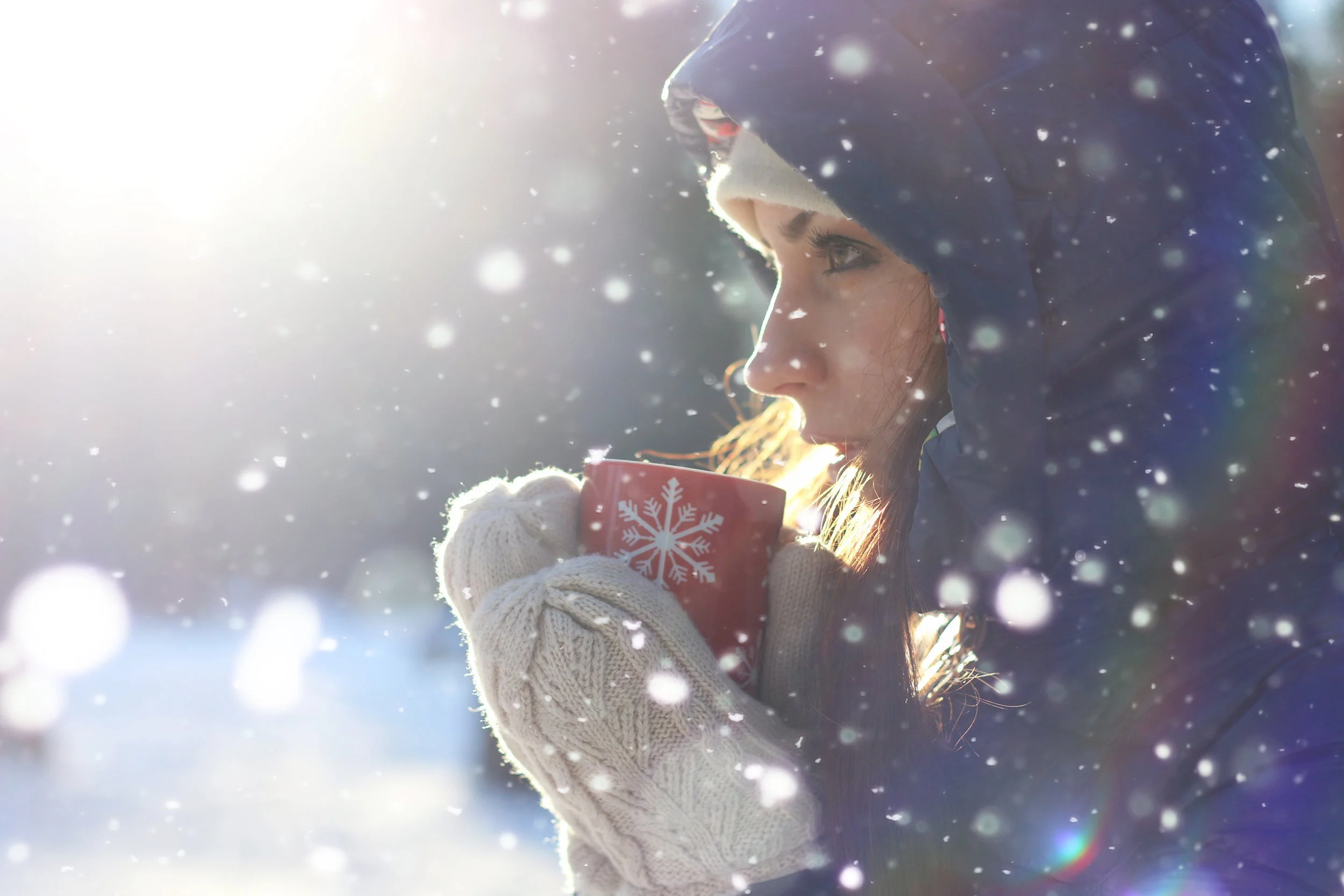I hear from folks all the time that they get their best quality sleep in the winter months.
This makes perfect sense. The external cues our bodies take from the environment to trigger the release of melatonin are at their strongest during this time of year. Those environmental cues are:
1) the absence of light
2) a drop in temperature
In the winter, the days are shorter and the temperature is cooler, so of course we're going to have a really nice strong melatonin response. However, this doesn't mean that the season isn't without its unique pitfalls when it comes to your sleep.
I want to take a moment to talk about those pitfalls today so that you can avoid them and still maintain wonderful, lush sleep this winter season.
Sleep Better Throughout the Chilly Season with These 4 Winter Sleep Tips
1
Get at least 2-10 minutes of sunlight exposure first thing in the morning.
Here’s why:
Although the shorter days of winter can help with melatonin production, they can also lead to a reduction in melatonin as well. This is because we need light exposure for our bodies to produce serotonin, the happy hormone, and serotonin is the precursor to melatonin.
It’s also really important when we get up in the morning that we're exposed to sunlight. This is because morning sunlight exposure tells the body to suppress melatonin and produce cortisol, the alert hormone. You want a nice surge of cortisol in the morning so that cortisol levels plummet throughout the day while melatonin levels start ramping up towards the evening. It’s with this flow in place that we're able to sleep well.
Morning sunlight also tells our body to produce melatonin about 13 hours later upon exposure. In the winter months, a lot of us are waking well before sunrise, so it's really important that you get that natural light exposure as soon as you can.
My recommendation:
Once the sun rises, try to get outside for at least 2-10 minutes without sunglasses. Another way to ensure that you get that nice spike of cortisol in the morning is to sit by a happy light when you drink your morning coffee, have breakfast, or get ready. Also try to get outside during the day! I know it can be really hard during the winter months, but you just need to make sure that you bundle up and it will pay off.
The more sunlight you can get during the day, the better your melatonin production is going to be at night. This is because, as I mentioned before, sunlight is required for serotonin production, which converts to melatonin. So bundle up and make it your 2022 goal to get outside for at least 15 minutes in the morning as well as 15 minutes in the afternoon and it will do your circadian rhythm some major good. And with this winter sunlight exposure, more is more! So if you can get outside longer than those two 15-minute sessions, even better. Your body will thank you.
2
Avoid eating a big dinner before bedtime.
Here’s why:
In the winter, we have a larger appetite (and we're also bored!), so we tend to overeat at nighttime. This impacts our sleep because when our bodies are digesting food, it's another signal to our circadian rhythm that it's nighttime.
My recommendation:
Aim to finish dinner at least 3 hours before bed. If you feel like you need a little snack in order to regulate your blood sugar before bedtime (which a lot of us do), keep it light. Keep it to 100-200 calories and make sure that it's balanced, consisting of complex carbohydrates, fat, and protein. A really good bedtime snack is whole-wheat crackers with peanut butter or cheese.
3
Watch for overheating at night.
Here’s why:
I know a lot of us like to bundle up in the winter months, but you don't want to do that when it comes to sleep. The reason why is because our body temperature has to lower by 2° in order to fall and stay asleep. There are also a lot of temperature fluctuations while we sleep.
My recommendation:
Still knock down your thermostat a couple degrees before you go to bed — you may even want to crack your window (I know it sounds crazy but I still do it in the winter months — the fresh air is really good for sleep!) You also want to make sure that you're sleeping in natural fibers and layers. That way, you can kick off your comforter or sheets if you tend to overheat. The fabrics you want to look for are breathable fibers such as linen, hemp, organic cotton, as well as wool.
4
Hydrate, hydrate, hydrate!
Here’s why:
Lastly, watch out for dehydration in the winter. Dehydration can lead to fragmented sleep because it can result in muscle spasms, cramps, night wakings due to thirst or headaches. You are still at risk of dehydration in the winter because 1) we're sweating more when we're bundling up to go outdoors, 2) the heat from radiators and forced air produces a low-humidity environment, which can lead to a lot of water loss, and then last but not least, 3) in the winter, we're less likely to carry around a bottle of water like we are in the summer months because in the summer, you're hot and you're naturally reminded to always have water nearby.
My recommendation:
Make sure you drink half your bodyweight in ounces of water every day to keep your body hydrated and your sleep sound. So keep that water bottle handy — even in January.
Get the winter hibernation sleep you deserve!
I hope these tips help you to get good sleep just like all those people who brag about the amazing sleep they get in the winter!
If you follow my advice and are still struggling with your sleep, there must be something deeper at play. That's where I come in as a sleep consultant. I get to learn more about your habits and your functional health so that we can get to the bottom of what is causing your sleep issues.
There is always a reason that you're not sleeping. So let me help you get to the bottom of it and get you back to sleeping. If you need extra assistance, please feel free to set up a discovery call to learn more about my process.
Sweet Dreams…
Kelly Murray is a certified sleep coach and an award-winning pediatric sleep consultant based in Chicago offering sleep coaching services nationwide.




